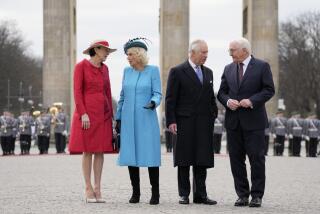International Business / Executive Travel: SPOTLIGHT ON GERMANY : Staying on the Mark in Germany
Business travel in Germany is increasing as more foreign investors look for ways to capitalize on the developing economy in its eastern regions, as well as those in other Eastern European countries. Here are some suggestions for making business trips to Germany go smoothly.
Getting There
A number of U.S. and international airlines fly to Germany from Los Angeles. American flies through Chicago or Dallas-Ft. Worth to Munich, Dusseldorf and Frankfurt. Delta connects through Atlanta, New York or Cincinnati to Hamburg, Berlin, Frankfurt, Stuttgart and Munich. Northwest flies through Boston or Detroit to Berlin or Frankfurt, or passengers can connect through Amsterdam and fly KLM to Frankfurt, Berlin, Dusseldorf and Hamburg. TWA connects through New York en route to Frankfurt.
Lufthansa, the German airline, flies direct daily from Los Angeles to Frankfurt, and the airline shares flights with Lauda Air, an Austrian carrier, on Wednesdays, Fridays and Sundays to fly directly to Munich. Another German airline, LTU, also flies direct from Los Angeles to Dusseldorf and Munich on Mondays and Thursdays. Frankfurt is the hub for trips to most of the country’s smaller cities.
Getting Around
Within Germany, both Lufthansa and LTU operate frequent flights among all major cities. If you’d rather take a train, Lufthansa runs the Lufthansa Express among Dusseldorf, Cologne, Bonn and Frankfurt exclusively for its ticket holders. (Baggage is automatically transferred between plane and train at the airport.)
German Railways operates a discounted “Rail and Fly” service connecting cities with 14 German airports. German Railways, one of the most extensive train systems in Europe, also connects all major cities in western Germany. In addition, high-speed express trains connect Hamburg to Frankfurt and Munich.
Driving in Germany can be an unsettling experience for Americans. Most Germans drive faster, particularly on the autobahns, where there’s no speed limit.
For those renting a car, an international driver’s permit is recommended but not required. However, you must have proof of liability insurance to drive, so double-check that it is included in your rental policy. National (known as InterRent and Europcar), Avis, Hertz, Thrifty, Dollar Rent a Car (known as Eurodollar Rent a Car,) and Budget operate in Germany. When getting quotes, remember that the figure will not include a 15% value-added tax.
For travel within cities, most business travelers prefer to take cabs.
It is customary to tip the driver by rounding up to the nearest full mark (or about 10%). In addition, expect to pay 50 pfennigs for each piece of luggage you carry.
Money
German currency is based on the deutsche mark, which equals 100 pfennigs. Banks and bank-operated exchange booths at airports and railroad stations usually offer the best exchange rates. Hotels, stores and private exchange firms will charge more for the service.
Traveler’s checks are widely accepted in all but the smallest cities or rural areas. Now that cash machines are proliferating throughout Europe, you may be able to get money through an international network such as Cirrus or Plus. If you use a credit card, the issuers typically charge 1% to convert a foreign purchase into a dollar amount.
Telephones
The phone system was updated in 1992 and is now fully automated throughout the country. To reach an operator for an international call, dial 0010.
Avoid making international calls from a hotel room, however, since you’ll be charged double or triple the norm.
Post offices have special booths for international calls, or you can make calls from public phones that say “Inlands und Auslandsgesprache.” You can buy a phone debit card from most newsstands or post offices, for use in most public phones. If you purchase a phone card for 50 marks, for example, you can make 60 marks worth of calls with it.
AT&T;, MCI and Sprint have special services that will help you avoid hotel surcharges.
Computers
German wall outlets require plugs with two round prongs rather than the two flat prongs that are standard in the United States, so an adapter is needed. Any appliance will also require a converter to operate on Germany’s 220-volt circuits.
Older laptop computers may require a special transformer to operate in Germany. Newer models have built-in sensors that can operate with only the adapter plug.
If your computer was not made in the United States, make sure you register it with U.S. customs upon leaving to avoid paying an import tax. If it is American, check with the German Consulate to see whether it should be registered upon entering.
Hotels
Although more business-class accommodations now have rooms with private baths, many hotels still have shared bathrooms, so make sure to request a room with a private bath if you want one. Remember that many German hotels do not provide soap.
Tipping
For luggage, it is customary to tip a hotel porter about 2 marks per bag. In restaurants, service charges are included in the bill. “Tipping is not as strict as it is here,” says Uwe Petri, a spokesman for the German Consulate in Los Angeles. “Only give a tip if you are very satisfied with the service.” If you do choose to tip, give it directly to the person who waited on you; do not leave it on the table.
Safety
Germany has a low violent-crime rate, according to the U.S. State Department. As in most countries, pickpocketing and purse snatching are most likely to occur in crowded urban areas.
When in Germany, you can get updated information on crime and security by calling the U.S. Embassy’s toll-free, 24-hour hot line: 0130-826364.
More to Read
Sign up for The Wild
We’ll help you find the best places to hike, bike and run, as well as the perfect silent spots for meditation and yoga.
You may occasionally receive promotional content from the Los Angeles Times.






